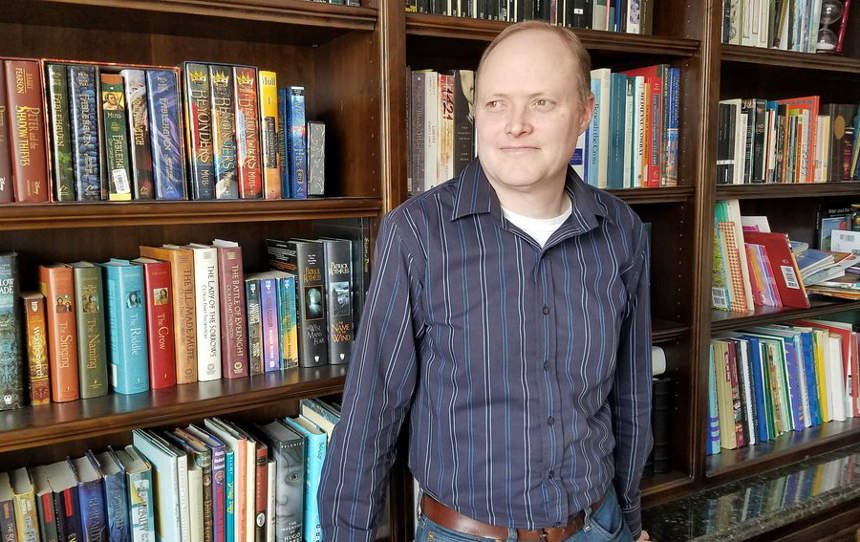Bestselling local author gives advice on beating writer’s block
Published at | Updated at
Every day at a scheduled time, author Jeff Wheeler shuts off his phone, dons a pair of noise-cancelling headphones, turns on a white noise machine and sits down at his computer. His goal? To enter a “flow state” that will allow the words for whatever story he’s writing to spill out like water from a hydrant.
“There’s this sweet spot that happens where it’s challenging but interesting,” Wheeler tells EastIdahoNews.com. “The level of difficulty is challenging but not too challenging, and your interest is high. When you hit that, your brain goes into this flow state where time just seems to vanish. That’s what I try to get into before I write my chapters.”
Whatever Wheeler’s doing, it seems to be working. His recent “Kingfountain” book series has put him on the “Wall Street Journal” bestseller list four times, and there’s plenty more where that came from. A ridiculously prolific writer, Wheeler pens a full-length book every three months.
The writing bug bit Wheeler early in life. Growing up in the Bay Area in California, he was inspired by the work of authors like Terry Brooks and fired up with a love of history. He produced a string of novels throughout his high school and college years. After graduating from San Jose State University, Wheeler worked at Intel, where he remained for more than two decades.
But he never gave up on his writing.
Wheeler’s persistence led to his big breakthrough with his “Muirwood” trilogy in 2011. Sales of “Muirwood” caught the eye of publisher 47North. Wheeler enthusiastically signed a book deal and the rest is fantasy fiction history. Recently, Wheeler retired from Intel and relocated to Sugar City. He’s now living a dream he built on a foundation of steady, consistent writing.
Wheeler says the key to his prolific output is just putting in time doing the work.
“I remember reading an interview with Stephen King that the creative energy is like a muscle,” he says, adding that frequently exercising that part of the brain helps keep his chops sharp and his imagination limber.
When I read something I don’t like, I don’t say, ‘This is garbage.’ I say, ‘I’ll fix this later.’

“I learned like, oh, never stop,” says Wheeler. “When you finish something, have your next project ready to go. Right now. I can crank out three or four books a year because the muscle is always being worked. That helps that creativity keep going.”
Constantly working out his writing chops has also helped Wheeler avoid one of novelists’ most vexing problems: writer’s block.
“I learned from Terry Brooks to set aside some time to write and just do it,” he says. “So that’s what I do. I have a writing schedule every week.”
Wheeler’s goal is to writing a full chapter during each writing session. He tries to manage his output and give himself break periods so he doesn’t burn out.
“I get my chapter done and then I have that little rest,” he says. “And I think about what’s coming next.”
He doesn’t work out the details, but he does figure out where his story needs to go next.
“Keeping to that schedule exercises the creative muscles, exercises the craft and the words just come,” Wheeler says. “If you exercise the muscle, it performs when it’s called on to perform.” As a result, he has never experienced writers block.
And what about the days when the words are coming, but they all stink? Wheeler has figured out how to deal with this, too.
“We have this critical voice in our head that tells we’re no good or we don’t fit in or we don’t belong,” he says. “I turned that voice off years ago.”
Although he admits that not everything he writes is gold, he takes an approach that is much less self-sabotaging.
“When I read something I don’t like, I don’t say, ‘This is garbage.’” he explains. “I say, ‘I’ll fix this later.’”

Along with the aforementioned tips, Wheeler suggested aspiring novelists start with something less lengthy.
“Before I wrote my first novel, I wrote my first short story,” he says. “A short story is like a novel, just really condensed, so it’s a great way to practice the craft.”
Wheeler says short stories offer a great way to practice story structure, world building and character development. Once you have those skills down, you can move on to more epic literary pursuits.
And most of all, keep writing!
For more information about Jeff Wheeler, click here to visit his official website.


